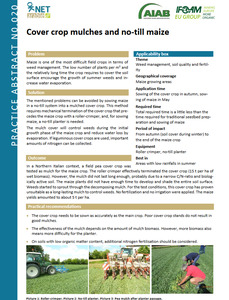{Tool} Cover crop mulches and no-till maize (OK-Net Arable Practice abstract). Creator(s): Bortolussi, Stefano. Issuing Organisation(s): AIAB - Associazione Italiana Agricoltura Biologica. OK-Net Arable Practice abstract, no. 020. (2018)
Preview |
PDF
- English
(Cover crop mulches and no-till maize)
535kB |
Preview |
PDF
- Italian/Italiano
(Roller-crimper e semina diretta del mais)
441kB |
![[thumbnail of 2024-07-26 10_00_54-Practice Abstract - PA_020_AIAB_cover_crop_no_till_maize_final.pdf – Mozilla Fir.png]](/32610/13.hassmallThumbnailVersion/2024-07-26%2010_00_54-Practice%20Abstract%20-%20PA_020_AIAB_cover_crop_no_till_maize_final.pdf%20%E2%80%93%20Mozilla%20Fir.png)  Preview |
Image (PNG)
- Cover Image
- English
315kB |
Document available online at: https://orgprints.org/32610
Summary in the original language of the document
In a Northern Italian context, a field pea cover crop was tested as mulch for the maize crop. The roller crimper effectively terminated the cover crop (15 t per ha of wet biomass). However, the mulch did not last long enough, probably due to a narrow C/N-ratio and biologically active soil. The maize plants did not have enough time to develop and shade the entire soil surface. Weeds started to sprout through the decomposing mulch. For the test conditions, this cover crop has proven unsuitable as a long-lasting mulch to control weeds. No fertilization and no irrigation were applied. The maize yields amounted to about 5 t per ha.
Practical recommendations
• The cover crop needs to be sown as accurately as the main crop. Poor cover crop stands do not result in good mulches.
• The effectiveness of the mulch depends on the amount of mulch biomass. However, more biomass also means more difficulty for the planter.
• On soils with low organic matter content, additional nitrogen fertilisation should be considered.
Summary translation
Si è testata una cover crop di pisello proteico che al momento della rullatura aveva una biomassa di circa 150 q/ha (tal quale). Il pisello proteico è stato efficacemente terminato dalla rullatura ma è stato consumato troppo velocemente dall’attività biologica del terreno. Questa pacciamatura è risultata quindi, probabilmente a causa di un rapporto C/N troppo stretto, non adeguata a garantire un controllo della flora infestante durante l’intervallo di tempo necessario al mais per chiudere la fila. Non sono state effettuate né concimazioni né interventi irrigui. La produzione finale di granella è stata di circa 5 t/ha.
Raccomandazioni pratiche
Osservazioni e consigli pratici
• La semina della cover crop deve essere effettuata con la stessa cura dedicata alla coltura da reddito. Cover crop dallo sviluppo non omogeneo non forniscono una pacciamatura soddisfacente.
• La pacciamatura risulta tanto più efficace sul controllo delle infestanti quanta più biomassa è presente. Allo stesso tempo, maggiore è la biomassa rullata, maggiore è la difficoltà incontrata dalla seminatrice ad operare correttamente.
• In funzione del contenuto di sostanza organica del terreno, una concimazione azotata potrebbe essere necessaria.
| EPrint Type: | Practice tool |
|---|---|
| What problem does the tool address?: | Maize is one of the most difficult field crops in terms of weed management. The low number of plants per m2 and the relatively long time the crop requires to cover the soil surface encourage the growth of summer weeds and increase water evaporation. |
| What solution does the tool offer?: | The mentioned problems can be avoided by sowing maize in a no-till system into a mulched cover crop. This method requires mechanical termination of the cover crop that precedes the maize crop with a roller-crimper, and, for sowing maize, a no-till planter is needed. The mulch cover will control weeds during the initial growth phase of the maize crop and reduce water loss by evaporation. If leguminous cover crops are used, important amounts of nitrogen can be collected. |
| Country: | Italy |
| Type of Practice Tool: | Practice abstracts |
| Theme: | Soil quality and fertility, Weed management |
| Keywords: | cover crop, reduced tillage, soil fertility, soil quality, weed management |
| Keywords: | cover plants, reduced tillage, soil fertility, soil quality, weed management, minimum tillage |
| Agrovoc keywords: | Language Value URI English soil fertility http://aims.fao.org/aos/agrovoc/c_7170 English soil quality http://aims.fao.org/aos/agrovoc/c_a9645d28 English weed control http://aims.fao.org/aos/agrovoc/c_8345 English cover plants http://aims.fao.org/aos/agrovoc/c_1936 English minimum tillage http://aims.fao.org/aos/agrovoc/c_32734 English arable farming http://aims.fao.org/aos/agrovoc/c_36528 |
| Subjects: | Soil > Soil quality Crop husbandry > Soil tillage Soil Crop husbandry > Weed management |
| Research affiliation: | European Union > Horizon 2020 > OK-Net Arable > OK-Net-Arable Tools European Union > Horizon 2020 > OK-Net Arable International Organizations > International Federation of Organic Agriculture Movements IFOAM > IFOAM Organics Europe Italy > AIAB European Union > Organic Farm Knowledge |
| Horizon Europe or H2020 Grant Agreement Number: | 652654 |
| Related Links: | https://organic-farmknowledge.org/tool/32610 |
| Project ID: | ofk |
| Deposited By: | Basler, Andreas |
| ID Code: | 32610 |
| Deposited On: | 01 Feb 2018 13:18 |
| Last Modified: | 17 Mar 2025 10:47 |
| Document Language: | English, Italian/Italiano |
| Status: | Published |
Repository Staff Only: item control page


